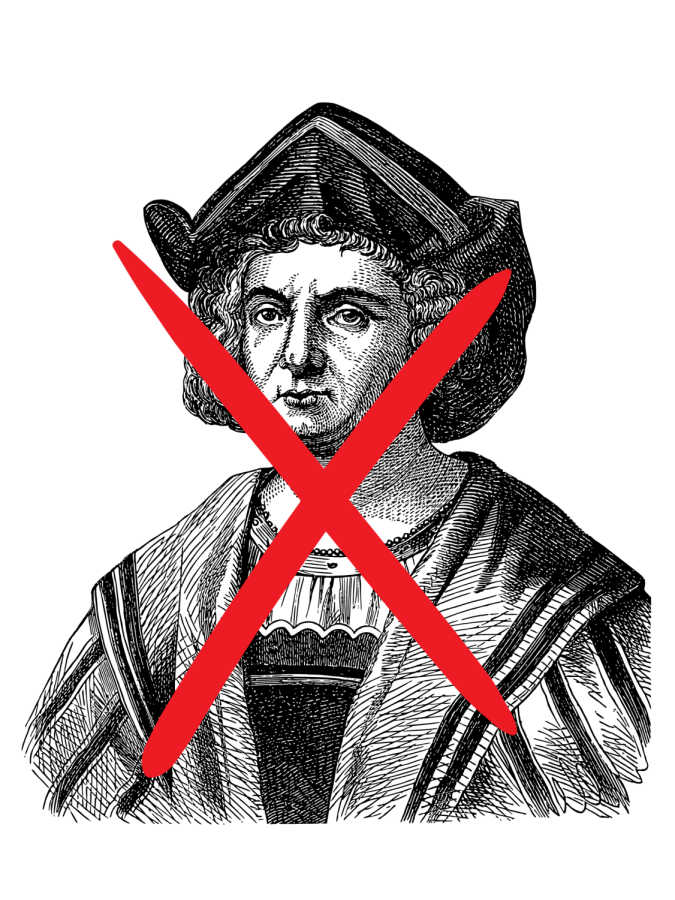I’m glad we don’t have Columbus Day off
November 9, 2022
“In 1492, Columbus sailed the ocean blue,” is a mnemonic device taught to students to remember the seemingly impressive journey made by Christopher Columbus to discover the land known as the United States. What the phrase doesn’t specify is the less-talked-about details of his journey; some do not know about how he sailed to the New World and became a renowned villain who is responsible for the colonization and murdering of Indigenous peoples. The romanticized version of Columbus– that for decades, was peddled out to students– portrayed him as a hero, but that is changing. With more access to information, we are seeing history rewrite itself and holidays shift as “Columbus Day” has morphed into a day of remembrance and appreciation of Indigenous people.
The “holiday” Columbus Day came about in the nineteenth century due to the arrival of Catholic immigrants. At the time, they were of a religious minority– Roman Catholicism– and they wanted to be remembered in America’s history. Since Columbus, a Catholic, had already been known for sailing to the Americas, many took that as an opportunity to stand their ground. The rationale behind this, though, was simply that the immigrants wanted to be seen as one with the American people.
In an article written by Liz Mineo and published by the official news website for Harvard University, The Harvard Gazette, titled, “A day of reckoning: Pushing to end myth of Columbus and honor history of Indigenous peoples,” included an interview with Megan Hill, who is a citizen of the Oneida Nation of Wisconsin. Hill said that, for Native people, Columbus Day represents “a celebration of genocide and dispossession”. Hill also claimed the day celebrates a “fictionalized and sanitized version of colonialism, whitewashing generations of brutality that many Europeans brought to these shores”. Indigenous peoples of the U.S. have always walked the lands of the Americas despite the colonization of newcomers. Countries such as those of the Spanish, French and English terrorized the people of the land through disruption of culture and devastating crimes; this then accumulated and led to a mass murder of around 95 percent of the Native population within a time frame of 130 years.
The reality of Columbus’s expedition is not worth celebrating; his discovery does not outweigh the damage done to the innocent. Those who continue to celebrate the impacts of Columbus are minimizing the hurt of Native Americans. Columbus’s overall perception of others dehumanizes and disregards the value that those people hold. Even after discovering the Americas, Columbus continued to haunt the Indigenous people through slavery and sexual violence. His journey is more than a discovery, it is a voyage led by a villainous, cruel man who was too self-absorbed in his ego to recognize the hurt he had on others.
Since the 1990s, states around the U.S. have been recognizing Oct. 10 as a day to spotlight Indigenous people, for they have been impacted the most by Columbus. According to The Conversation’s article titled, “Indigenous Peoples Day: Why it’s replacing Columbus Day in many places,” author Beth Daley writes, “South Dakota – currently the state with the third-largest population of Native Americans in the U.S. – became the first state to officially recognize Native Americans’ Day.” As of today, states including Iowa, Michigan, Oklahoma, Minnesota and many more acknowledge Indigenous Peoples Day, too. Though there has been some progress in removing Columbus Day from calendars around the country, parents of students attending a school in Parsippany, New Jersey protested against Indigenous Peoples Day as it was a “failure to honor the legacy of Italian immigrants and the need for a “more balanced picture of Columbus” – stated by the same article published by The Conversation.
As for Lincoln Public Schools (LPS), Columbus Day hasn’t ever been given as a day off for students. Associate Superintendent for General Admission and Governmental Relations Dr. John Neal has been assisting with the creation of the school calendar since 2008. The school calendar is a representation of the district’s commitment to the education of students, and it ensures that students are getting the most of their time in school. With this, Columbus Day hasn’t been considered a holiday on the calendar even when looking at records from 120 years ago.
“Historically, LPS has not offered Columbus Day as a non-student holiday. Its proximity to the Teachers Convention (historically in October) and fall/quarter break has made it difficult to add it as another non-student day in October,” Dr. Neal said.
Middle school and high school students have had school in session on Columbus Day since the late 1800s, but elementary schools have a different story. The only exception to the day being given off is for the sake of elementary school teachers.
“[Columbus Day] has only been an elementary plan day in these years: 1990, 1994, 1995, 1996, 1997, 1998, 1999, 2000, 2005, 2006, 2008, 2009, 2013, and 2014,” Dr. Neal said.
Though LPS chooses not to recognize Columbus Day as a day to be given off, school districts around the country vary. In an article written by Ramishah Maruf and published by CNN titled, “Columbus Day and Indigenous People’s Day 2022: Here’s what’s open and closed,” it stated, “Columbus Day, and now Indigenous People’s Day, will be observed on Monday, October 10 this year” for schools in New York. Aside from schools, common places that are closed on the tenth include banks, post offices and government institutions such as the DMV.
Recognizing Columbus Day continues to tell Native Americans that their suffrage is not as prominent as his discovery. It is essentially a form of invalidation and that their existence is not worth celebrating. Continuing to choose Columbus over the Indigenous strengthens the belief that minority groups do not matter and those of European descent will always be more relevant than anyone else. Indigenous Peoples Day is the day where lives can be recognized and voices can be heard for they have been shut for hundreds of years. Celebrating the life of a colonizer is immoral, and it silences the stories of the pain the victims endured. Native Americans are the foundation of the Americas, and they were the first people to discover the New World long before any other person. Native Americans deserve to be recognized for their impact on history, and for that to happen in a genuine manner, Columbus Day must leave and make way for Indigenous Peoples Day.









